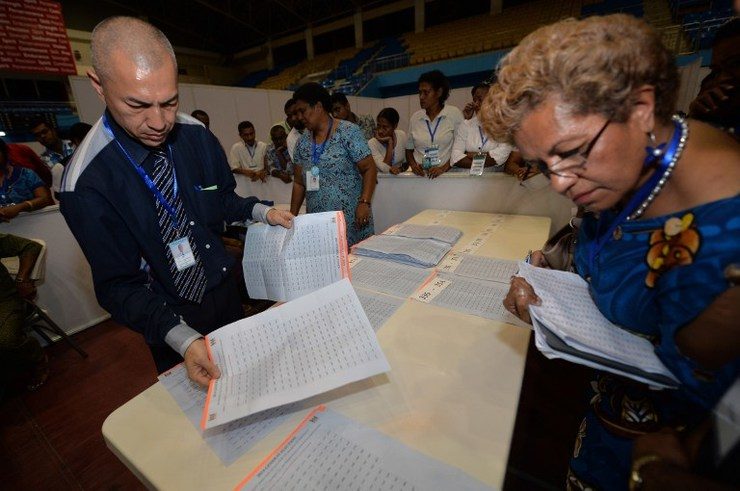SUMMARY
This is AI generated summarization, which may have errors. For context, always refer to the full article.

SUVA, Fiji – Military strongman Voreqe Bainimarama was on course Thursday, September 18, to win the South Pacific nation’s first election since he staged a bloodless coup in 2006, official data showed.
Preliminary results from Wednesday’s (September 17) poll put Bainimarama’s Fiji First Party on 60.17%, with more than half the vote counted. Nearest rival Sodelpa was on 26.71%, and the National Federation Party was the best of the other five on 5.66%.
As of 8:00 am (2000 Wednesday GMT), Fiji First had 233,094 of 387,400 ballots counted in a total of 590,000 registered voters, according to data from the Fiji Elections Office.
Officials say an officials declaration could take days but, if confirmed, the figures would give Bainimarama a majority in a new 50-seat parliament, allowing him to rule in his own right.
A multi-national observer group comprising officials from more than a dozen countries has been monitoring as voters in Fiji’s 300-plus islands cast their ballots.
The group is expected to release initial findings later Thursday on whether the poll was conducted legitimately.
Fijian officials said late Wednesday that the return to democracy had been trouble free, with fears that violence could flare as it did after a 2000 coup proving unfounded.
The election extended full voting rights for the first time to ethnic Indians, descendants of sugar plantation workers shipped in by the British during the colonial era who now comprise about 40 percent of the 900,000 population.
It is seen as pivotal to ending the country’s “coup culture”, which saw four governments toppled between 1987 and 2006, largely due to tensions between indigenous Fijians and ethnic Indians.
Bainimarama used the military to seize power in 2006, vowing to stamp out corruption and end the racial divisions.
His authoritarian regime did bring stability, but in the process tore up the constitution, sacked the judiciary and tightened media censorship, prompting Fiji’s suspension from the Commonwealth and the Pacific Islands Forum.
Bainimarama has focused on growing the tourism-reliant economy, winning favor with policies such as free education and improving infrastructure in rural areas.
The restrictions he imposed have been relaxed in recent years, and winning an election deemed free and fair by neutral observers would give his government the international recognition that has so far eluded it.
Regional powers Australia and New Zealand lifted sanctions earlier this year to encourage the return to democracy, although Amnesty International still has concerns about abuses its says were perpetrated by Bainimarama. – Rappler.com
Add a comment
How does this make you feel?
There are no comments yet. Add your comment to start the conversation.